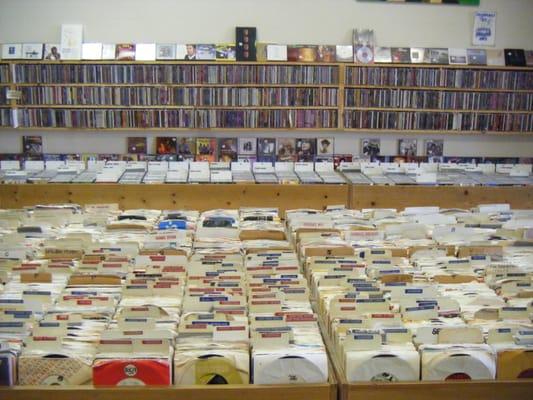Recently, vinyl records have seen a massive comeback across many generations of people and has outlived the iPod, cassettes, and even CDs. These days, it is much easier to buy records with the growth of various record shops and online services such as Amazon or Ebay. When it comes to buying records, not every album is going to be easy to find on record, until you actually find them. This can be due to its time of release or just how much the record label presses their albums. Some collectors like to call this the “hunt.” While record collecting can be a fun hobby to get into, it can also be quite expensive and daunting to get started, especially with investing in a good turntable and stereo system. Here in this guide, we will help you get started today on where you need to look into when getting into record collecting.
Find Some Great Turntables On The Market:
Arguably the most difficult part to getting started with record collecting is actually finding a turntable. While you can go the cheaper route of buying a turntable, you will lose the great sound quality and reliability when it comes to lower-end record players. If you want a record player that isn’t stretching too much in terms of price but will still give you high-quality sound, a good place to start is a turntable costing between $200 to $500. Some recommendations around this price range include the Audio Technica LP 120 and the U-Turn Audio Orbit. Of course, if price isn’t too much of a concern for you, there are many more higher-end options out in the market as well. This includes the Pro-Ject RPM 5 Carbon and Technics SL-1210G Grand Class.
Investing In Pre-Amplification, Receivers, and Stereo Speakers:
Turntables aren’t the only piece you need to play your precious vinyl records as you will also need pre-Amplification, receivers, and stereo speakers. Although if you’re just starting out, having just a decent turntable with a built-in phono pre-amp and a pair of good speakers might be the only thing you need to play your music. If you already have an integrated amp or A/V receiver, check to see if it has a phono input. Usually with newer stereo receivers you have them built in, but if not, using an above-mentioned phono pre-amp to boost the turntable’s signal. If your turntable has a built-in pre-amp, you can improve your sound quality over a built-in phono port. For instance, the Audio-Technica AT-LP120 includes USB outputs for archiving vinyl into digital audio files.
Finding Records You Want To Buy:
When it comes to buying records, it’s too easy to buy a lot when you’re shopping because you are buying records you think you should buy. While it’s cool to have the essentials, it’s important to buy the records you will continue to listen to. Usually, it’s better to start off small rather than buy a large collection of records right away. The good news is that vinyl is never going out of fashion anytime soon, so you have an opportunity to take it slow when collecting.
Finding Space To Store Your Records:
Records can take up a lot of space and need a place to be stored. The location you choose for your record collection is essential for maintaining your collection. There are a few things to consider when you are storing your collection. First important aspect to storing your records is to keep them in a cool area. You don’t want your room to be too cold or too hot. If your records are exposed to high temperatures, then they will warp or lead to other damaging effects.
Another aspect people don’t often think about is the light. An excessive amount of light or sunlight can damage your records over time. UV lights will also cause the same effect to your records. Make sure you don’t store your records near a window where they can be exposed to light. Shelving is also really important as you don’t really don’t want to toss your records into a bin. Try to opt for a shelving solution that allows you to separate and stand your records. You don’t want to have 15 records leaning against each other, as this will lead to unwanted pressure weighted on the records. Records (12-inch LPs) tend to weigh about 5 ounces
Check Out Your Local Independent Record Shop:

Supporting your local record stores is a great way to get into vinyl collecting. The best part about independent record stores is that they are all unique and have their own albums they sell. Many independent record stores also sometimes offer exclusive pressings of many artists and bands. They also might also sell any promotional singles or posters to give away with the exclusive pressing of an album. If you don’t have access to great record stores near you, these days you can purchase an album from a store’s website and have them mail a record to you. Lots of great independent record stores will usually provide info on any upcoming releases.
Check Out Your Local Retailers As Well:
Retailers like Urban Outfitters, Target, and Barnes and Noble will also sell vinyl records at their music sections. You will find records of many mainstream artists on vinyl if you go to your local retailer. Many retailers try to take advantage of the vinyl market by offering exclusive pressings of albums you wouldn’t be able to find anywhere else. These are a great alternative if you don’t have a local independent record near where you live.
Use Social Media To Find A Community:
If you follow any record stores on Instagram or Facebook, you might find other social media accounts that are dedicated to record collecting. This is one of the many great ways you can search for virtual communities. Sharing what you have in your collection to these communities allows you to start online friendships.
Sources:
https://wired.com/story/new-to-vinyl-records-shopping-what-you-need-to-know/
https://thesoundofvinyl.us/blogs/vinyl-101/how-to-store-vinyl-records
